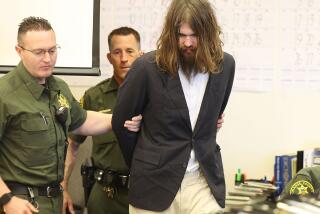Court Upholds Reduced Jail Sentence of British Nanny
- Share via
BOSTON — By a vote of 4-3, the highest court in Massachusetts on Tuesday upheld a lower court’s decision to reduce the conviction of British au pair Louise Woodward from murder to manslaughter and to sentence her to time served, 279 days.
The 46-page ruling by the state’s Supreme Judicial Court cleared the path for Woodward, convicted last year in the shaking death of an 8-month-old infant in her care, to return home to Elton, England. Pending Tuesday’s ruling, Woodward had been staying in private homes in the affluent seaside community of Marblehead.
Along with her father, Gary, the 20-year-old Woodward remained secluded Tuesday. Hours after the high court’s verdict was announced, however, their privacy was interrupted when sheriff’s deputies served Woodward with notice that physicians Sunil and Deborah Eappen had filed a civil suit charging her with the wrongful death of their son, Matthew. Their primary purpose appears to be to block her from profiting from the case.
Woodward’s attorneys described her as at once relieved that the high court supported Judge Hiller B. Zobel’s unusual reduction of her conviction, and disappointed that she was not exonerated entirely. At a press conference, attorney Andrew Good reiterated the defense position that “unrefuted medical evidence” proved that Matthew Eappen’s fatal head injuries did not occur while the child was in Woodward’s custody.
But Middlesex County Dist. Atty. Tom Reilly was equally firm as he stated: “The truth of this case is and always will be that Louise Woodward killed Matty Eappen.” Nonetheless, he said he considered the case concluded.
The Supreme Judicial Court did not disagree. “We do not view the judgment against [Woodward] as a light matter,” Justice Margaret Marshall wrote in the majority opinion. “She stands guilty of causing an infant’s death.”
In Britain, television news all evening was dominated by Woodward’s release. But there was little of the nationwide outpouring of passionate fellow-feeling for the ex-nanny that had made itself felt at the time of her trial and sentencing last fall.
In the year and a half after the death of the Eappen child, the case of Louise Woodward became an international cause celebre, the most widely watched courtroom drama since the O.J. Simpson trial. Prosecutors portrayed her as a flighty teenager who by her own admission “was a little rough” in her handling of a baby she viewed as excessively fussy. Her defense team countered with medical evidence suggesting that the child’s fatal skull fractures predated the occasion when Woodward was accused of mishandling Matthew.
Defense lawyers further painted Woodward as a naive foreigner victimized by a culture at once obsessed with child abuse and ambivalent about working parents who consign the care of their children to outsiders. Tabloids in England and the U.S. dubbed the case “Nannygate.”
But even without the catchy nickname, the case was rife with sensational elements. Recently, her mother denied allegations that she misappropriated funds from a $400,000 legal defense account raised by supporters in England and the U.S.
Just two weeks ago, one of Woodward’s defense lawyers was arrested for drunk driving. The state trooper who arrested Elaine Whitfield Sharp said the attorney told him she had been under severe stress because she no longer believed her client was innocent. Whitfield Sharp later insisted that the trooper had fabricated the story. She also claimed that the officer propositioned her sexually.
The legal twists in the Woodward case were no less curious. Superior Court Judge Zobel stunned seasoned courtroom observers when he invoked a provision of Massachusetts law allowing him to overrule a jury. Zobel said Woodward had suffered enough.
Woodward’s attorneys had gambled when they demanded that their client be tried for murder rather than manslaughter, and the Supreme Judicial Court on Tuesday faulted Zobel for restricting the jury from considering the lesser charge. In their appeal, prosecutors argued that the public would balk at serving on juries if their decisions could so easily be set aside.
The case also led to examination of the au pair system, a cultural exchange administered through the U.S. Information Agency, an arm of the State Department. Au pairs generally are young men and women, often students. No formal training is required for them to be placed with families.
Woodward’s lawyers said Tuesday that she was eager to return home, and that she would probably go back to school in England. The Eappen family, for their part, left their home in suburban Newton on Tuesday under a police escort. Accompanying the physicians were their 5-year-old son, Brandon, and their new baby, Kevin. Deborah Eappen has said the infant looks just like Matthew.
Speaking for the family from Chicago, Achamma Eappen, the paternal grandmother of Matthew, said, “I’m not angry, but it’s kind of--you lose faith in the justice system, you really do.”
Times staff writer Vanora Bennett contributed to this story from London.
More to Read
Sign up for Essential California
The most important California stories and recommendations in your inbox every morning.
You may occasionally receive promotional content from the Los Angeles Times.













